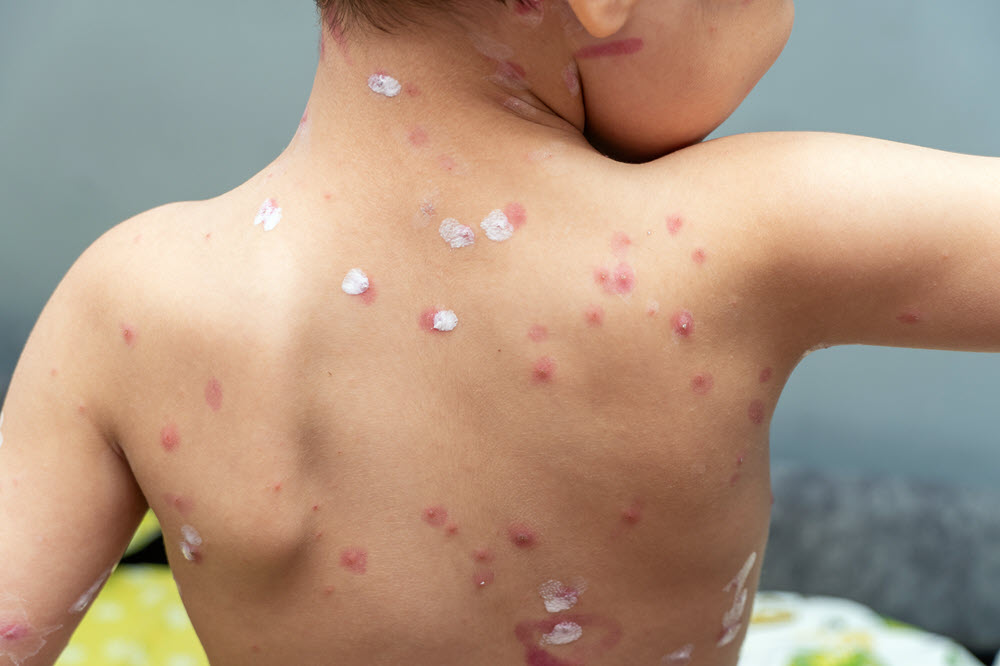Infections - Prevention, Diagnosis & Treatment
Chickenpox
By S.I. (staff writer) , published on November 02, 2021

Medicine Telehealth Health viral infection itching
What is chickenpox?
The varicella-zoster virus causes chickenpox, which is a highly contagious infection. It primarily affects children, although it can impact adults too [1].
An extremely itchy skin rash with scarlet blisters is the hallmark indicator of chickenpox. These painful blisters rupture and begin to bleed for several days or even weeks, depending upon the severity of the disease.
Rashes can migrate to your nose, throat, eyelids, and even your sexual organs in severe situations. After that, they dry and flake off before ultimately repairing.
After coming into contact with someone who has the virus, symptoms develop 10 to 21 days later. Most folks are back to normal in around two weeks. It is usually a minor, self-limiting sickness in healthy persons, with a low-grade fever, malaise, and a widespread, itchy, vesicular outbreak.
What are the Signs and Symptoms of Chickenpox?
The most frequent sign of chickenpox is an itchy rash that would not go away.
The following non-rash symptoms may persist for a few days [2]:
- Fever
- Headache
- Loss of appetite
As long as those red rashes on your body are concerned, they would go through these three stages before being eliminated from your body.
- You would acquire a rash of red or pink lumps all over your body.
- They would become blisters filled with fluid that oozes.
- The pimples would grow crusty, scab over, and begin to heal
However, it is pivotal for you to comprehend that not all the rashes in your body would be in the same phase simultaneously. The ones on your hand might be healing, whereas a new one would pop near your eyeballs. That is normal and fine.
What causes chickenpox?
It is a viral disease that is caused by contracting the Vartcella-zoster virus. It is contagious and can spread by coming in contact with someone who is suffering from it [3].
What are the common treatment options?
Chickenpox usually goes away on its own in a week or two. Vaccination can help avoid it.
Pain: Tylenol (acetaminophen) may help with the symptoms of fever and aches. Chickenpox should not be treated with aspirin-containing medications since they can cause problems. Rest is encouraged.
Preventing dehydration: Your body needs fluids, and now that you have chickenpox, you need much more fluids. Dehydration could delay your rash healing time and might even worsen it. Hence, it is essential to stay hydrated.
Mouth soreness: If you have sore areas in your mouth, sugar-free lollies can help you feel better. Foods that are salty or hot should be avoided. Soup may be a decent alternative if chewing is difficult, but that should not be too heated.
Itchiness: Itchiness can become intense; therefore, it is essential to keep scratching to a minimum to avoid scarring.
Scratching can be avoided by the following measures:
- Putting mittens or even socks over a child's hands before they go to sleep so that any attempt at scratching throughout the night does not harm the skin.
- Using calamine lotion or taking an oatmeal bath to relieve itching.
- Antiviral therapy may be recommended during pregnancy, in adults who are diagnosed early, in newborns, and in people who have a weaker immune system.
References:
- https://www.researchgate.net/publication/288751628_A_clinical_study_of_chicken_pox_in_adolescents_and_adults
- https://www.ncbi.nlm.nih.gov/books/NBK448191/#:~:text=Chickenpox%20results%20in%20a%20skin%20rash%20that%20forms%20small%2C%20itchy,last%20five%20to%20seven%20days.
- https://www.ncbi.nlm.nih.gov/books/NBK448191/#:~:text=Chickenpox%20or%20varicella%20is%20a,following%20reactivation%20of%20latent%20infection).
- https://www.ncbi.nlm.nih.gov/books/NBK448191/#:~:text=In%20adults%2C%20infection%20tends%20to,important%20part%20of%20the%20management.
Find articles related to: Medicine Telehealth Health viral infection itching
More articles about Infections - Prevention, Diagnosis & Treatment
Back to the Health Tips Index




